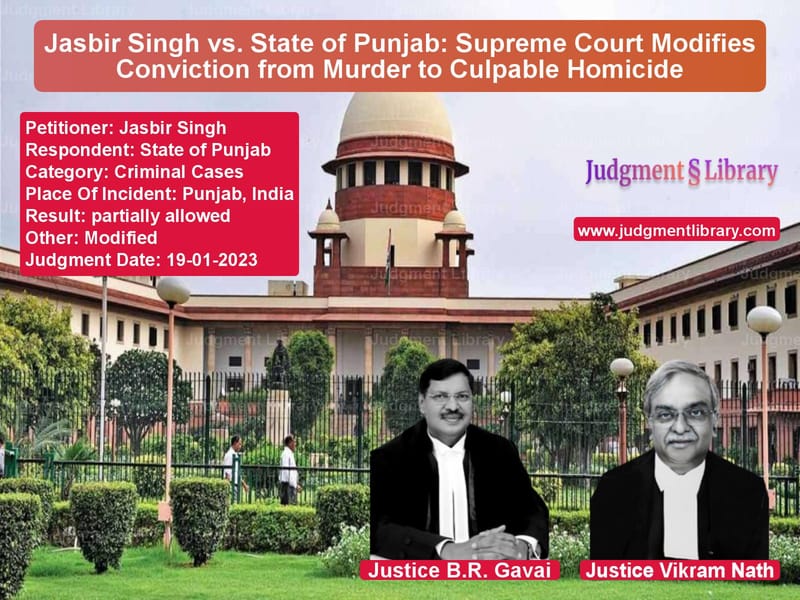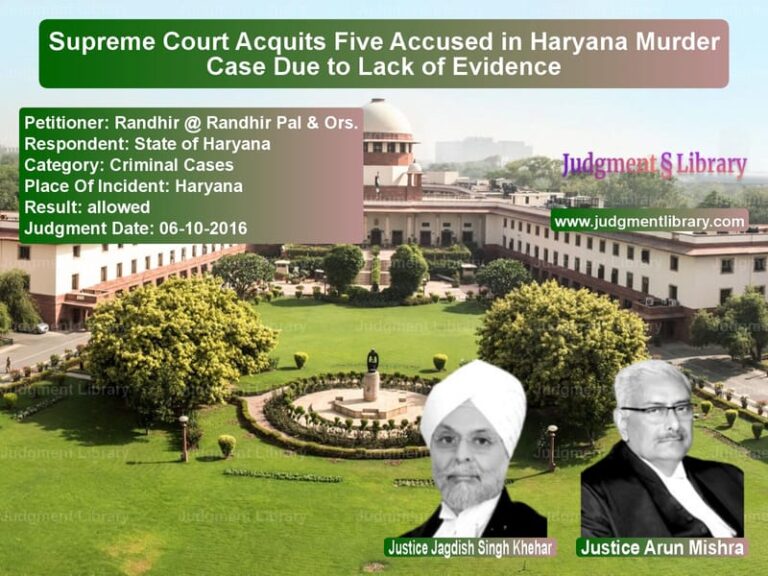Jasbir Singh vs. State of Punjab: Supreme Court Modifies Conviction from Murder to Culpable Homicide
The case of Jasbir Singh vs. State of Punjab revolved around a conviction under Section 302 of the Indian Penal Code (IPC) for murder, which was later modified to Section 304 Part I (culpable homicide not amounting to murder) by the Supreme Court. This judgment, delivered on January 19, 2023, highlights the interpretation of self-defense and the degree of force used in response to an attack.
The Supreme Court ruled that the accused had acted in self-defense after being attacked by a large group of people. This crucial decision led to a significant reduction in the sentence, considering that the appellant had already served nearly five years in prison.
Background of the Case
Jasbir Singh, the appellant, was convicted alongside five others by the Sessions Court under Section 302 read with Section 149 IPC and was sentenced to life imprisonment. However, upon appeal, the Punjab and Haryana High Court acquitted the co-accused but upheld the conviction of Jasbir Singh.
Read also: https://judgmentlibrary.com/murder-conviction-upheld-supreme-court-ruling-in-john-anthonisamy-case/
The prosecution argued that the appellant fired two rounds at the complainant party, resulting in a fatality. The defense contended that Jasbir Singh was merely protecting himself and his property from an aggressive crowd that attacked him in his own house.
Petitioner’s Arguments
The petitioner’s counsel contended that:
- The appellant was in his own house when the complainant party, consisting of 30-35 armed individuals, attacked him.
- The complainant party was the aggressor, and the appellant acted in self-defense to protect himself and his property.
- The High Court itself noted that the complainant party was the aggressor but still upheld the conviction under Section 302 IPC.
- The use of a firearm in such a scenario was reasonable given the circumstances, and the appellant did not intend to commit murder.
Respondent’s Arguments
The State of Punjab opposed the appeal and argued:
- The complainant party was only armed with lathis (wooden sticks), whereas the appellant used a firearm.
- Even if the complainant party was aggressive, the use of a firearm was excessive and could not be justified under self-defense.
- The appellant had fired two rounds, showing an intention to kill, which warranted the murder conviction.
Supreme Court’s Observations
The Supreme Court, comprising Justice B.R. Gavai and Justice Vikram Nath, made the following key observations:
“The defense version is more probable where Jasbir Singh appellant has stated that it was the complainant party who attacked him and his companions, and he fired in self-defense. Complainants are, in fact, the aggressors.”
The Court found that:
- The High Court acknowledged that the complainant party was the aggressor but still convicted the appellant under Section 302 IPC.
- The appellant was entitled to the benefit of Exception 2 of Section 300 IPC, which states that culpable homicide is not murder if the offender is deprived of self-control due to a sudden attack.
- It was reasonable for the appellant to react in such a manner given the circumstances.
Supreme Court’s Verdict
The Supreme Court ruled that the conviction under Section 302 IPC was not sustainable and modified it to Section 304 Part I IPC. The Court noted that:
- The appellant had already served about five years in prison.
- A sentence equal to the time already served would be sufficient for the offenses under Section 304 Part I IPC and Section 307 IPC (attempt to murder).
The Court ordered that the appellant be released immediately, and the bail bonds were discharged.
Legal Significance of the Judgment
This case underscores the principles of self-defense and proportionality in the use of force. It sets an important precedent that:
- Courts must evaluate whether an accused person acted in self-defense when attacked by a large group.
- Disproportionate use of force must be carefully assessed based on the situation.
- Section 300 IPC exceptions play a crucial role in determining the nature of a homicide offense.
Conclusion
The Supreme Court’s judgment in Jasbir Singh vs. State of Punjab is a landmark ruling on self-defense. By modifying the conviction from murder to culpable homicide not amounting to murder, the Court reaffirmed that the right to private defense is a crucial legal principle that must be upheld fairly.
Petitioner Name: Jasbir Singh.Respondent Name: State of Punjab.Judgment By: Justice B.R. Gavai, Justice Vikram Nath.Place Of Incident: Punjab, India.Judgment Date: 19-01-2023.
Don’t miss out on the full details! Download the complete judgment in PDF format below and gain valuable insights instantly!
Download Judgment: jasbir-singh-vs-state-of-punjab-supreme-court-of-india-judgment-dated-19-01-2023.pdf
Directly Download Judgment: Directly download this Judgment
See all petitions in Bail and Anticipatory Bail
See all petitions in Attempt to Murder Cases
See all petitions in Murder Cases
See all petitions in Judgment by B R Gavai
See all petitions in Judgment by Vikram Nath
See all petitions in partially allowed
See all petitions in Modified
See all petitions in supreme court of India judgments January 2023
See all petitions in 2023 judgments
See all posts in Criminal Cases Category
See all allowed petitions in Criminal Cases Category
See all Dismissed petitions in Criminal Cases Category
See all partially allowed petitions in Criminal Cases Category







